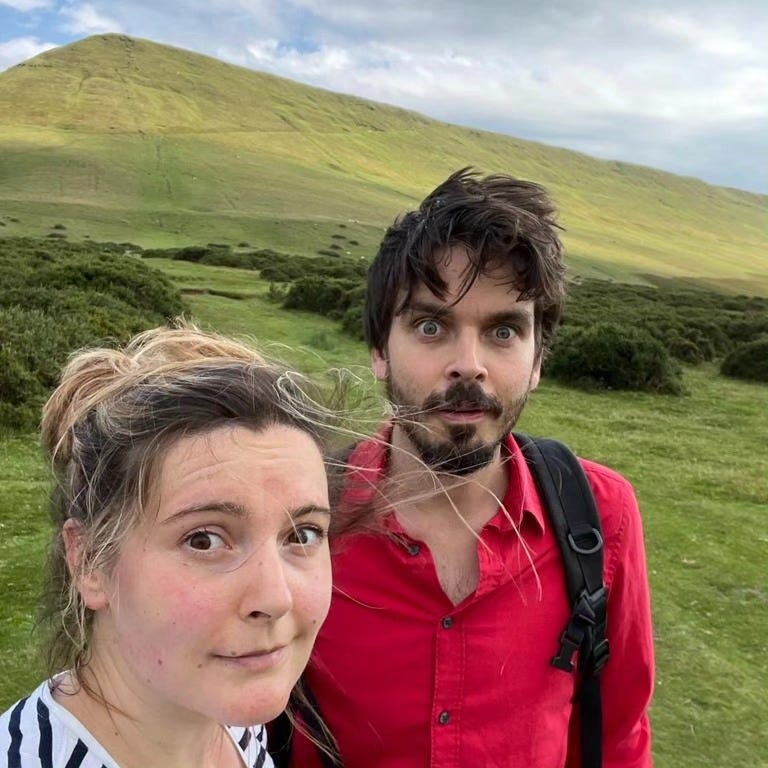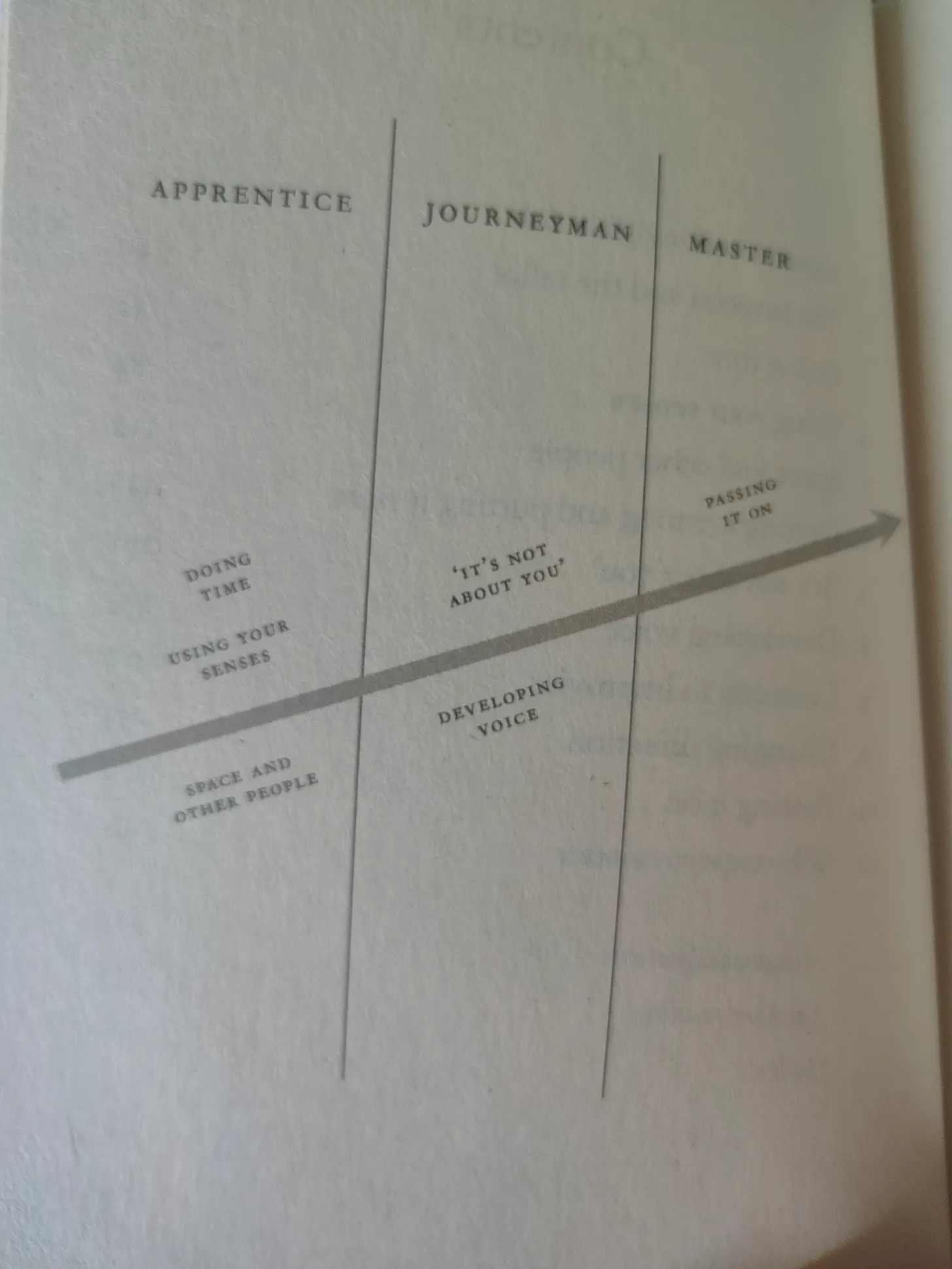Tape 114: “The Path To Mastery”
I’m back! I had such a nice break. Thank you for all your warm wishes! I feel refreshed and creatively engaged and on top of the world. Nice feeling! Anyway, while I was away I read Roger Kneebone’s excellent book Expert: Understanding The Path To Mastery, which is about the psychological process of becoming an expert in anything. You all remember Roger Kneebone (do you? Bit presumptous of me) – he’s the former surgeon-turned-GP-turned-expert-on-experts who also juggles and flies planes and builds harpsichords who I wrote about a few weeks ago. Reading his book actually made me very envious of his ability to see something and go “That looks interesting, I’m going to do it.” I like to think that I have a similar mindset myself, but then when I look at what I actually spend most of my time doing, it’s not really borne out by the evidence. I seem to be someone who stays in their lane most of the time, but Roger’s book has made me decide to take salsa classes or something, maybe.
Anyway, Roger’s book outlines a model for what he calls “The Path to Mastery” which, he asserts from his years of conversations with experts in various fields, holds true for all different types of expertise, from medicine to performance to engineering to coding. It looks like this:

As you can see, this model tracks people as they move through three distinct phases, from Apprentice through Journeyman to Expert. While I was reading the book, I was trying to apply this model to my own journey through working in comedy to figure out where I sat on that scale, and to try and place its various “chapter points” – “Doing Time,” “Space And Other People,” “Developing Voice” etc – at specific points on my own path to see how true the model held for me. By this model, the arrival at the “Expert” stage is heralded by the realisation that the knowledge and skill you’ve built up actually has value for other people in your field earlier in their journey, who you can help by passing your expertise on. This is something I’ve started very tentatively doing this year via the setting up of a consultancy practice on live shows and comedy scripts and of a series of workshops for Angel Comedy on theme, meaning and intention in solo show-making, as well as in my role as director on a couple of live shows. I’m very reluctant to accept that this makes me an “expert” on live or scripted comedy, because this part of my creative practice is very new – I’ve left all these workshops and consultancy sessions feeling like I learned as much as the people I was helping! So if I am approaching that stage of my work, then I think I must very much be hovering on the doorstep, as I still feel a lot of imposter syndrome around offering my “expertise” to other people. But I am seeing it help build people’s confidence and unlock new ideas for them that they seem to find interesting and rewarding, so I’m also slowly dismantling my own tendency to talk down my ability and recognise that it’s a role I can do good work in!
For this week’s newsletter, though, the chapter I wanted to focus in on was called “It’s Not About You.” In this chapter, Roger explains that the key factor in moving from “Apprentice” to “Journeyman” is recognising something that comes with great difficulty in the early years of doing anything – that your own personal skill, or interest, or ability at the thing you’re learning is actually secondary to how you use that skill to serve somebody else. This rang really true for me in my own experience in comedy. For a long time in comedy, I think your focus is entirely on yourself, which seems preposterous for an art form that is entirely geared around creating a specific response in a live audience. But, like anyone in the early stages of a creative pursuit, we start by imitating what we’ve seen elsewhere without necessarily having a full grasp of why it works. Then we tend to hyper-focus on ourselves as we learn to innovate beyond what we’ve seen elsewhere – we look at the audience’s laughter not as being indicative that they are having a good time, but instead as a marker that we are doing a good job. We perhaps get carried away with our own perspective on ourselves, where we pat ourselves on the back for innovating, and struggle to see ourselves from the outside-in. So many of my early shows were specifically about this disconnect – about the impossiblity of showing somebody who you really are, which showed that I was aware of the problem, but wasn’t necessarily coming up with any solutions yet. That idea is still a key ingredient of my more recent shows as well, but I think I’ve learned to better answer the obvious question in response to this thought – “But why should we care?”
These days, I count Lee Griffiths of Soho Theatre as a good friend and collaborator who I love working with, so I was very pleased this year that he felt we were close enough for him to be candid about his thoughts on my early shows. He said he remembered a show in 2015 where I made fun of some people in the audience who weren’t enjoying it, and that “it was all very well, and you were being quite funny about it, but you weren’t giving me a reason to find it funny. It was just funny to you that they didn’t agree with you, but I wanted more of a way in.”
I think my subsequent shows got a little better at that, and then my 2019 show, Joz Norris Is Dead. Long Live Mr Fruit Salad, was the piece of work that moved me from my Apprentice stage to my Journeyman stage. That show was the result of an enforced break from what had become a habitual pattern of making a new Fringe show every year, and that break in the pattern coincided with some upheavals in my personal life that forced me to finally confront the central problem head on – it didn’t matter how inventive or clever I thought I was being, or how good I thought I was at making original, weird comedy shows, if my principle focus wasn’t the audience’s experience of what I was doing. That show was the first show I made from a place of care for the audience, not from a place of wanting to show off to them. It was the first show where, consistently throughout the creative process, I kept asking myself “But does this make sense to them? Am I giving them all the information they need in order to understand it? Am I giving them too much information? Am I letting them feel comfortable? If I’m making them feel uncomfortable, what’s the purpose of that? What am I using that discomfort to express?” And so on, and so on. For the first time, the most important thing to me wasn’t that I got to put on a show and do whatever I wanted, it was that the audience understood and cared about what I was doing. It was a huge sea change in my thinking, and it created huge results.
I suppose, then, that the five years since I started making that show are my “Journeyman” phase, with all that that entails (the “Developing of Voice,” as Roger sees it). It feels like a funny coincidence, and also perhaps not like a coincidence at all, that if this year is the tentative, hesitant beginning of my stepping into a new phase that involves passing on my knowledge to other people, then the times in my life when I have passed from one of Roger’s “Stages of Expertise” to another have both been years when I broke habitual patterns and chose not to do the thing that had become familiar and comfortable up until that point. Sometimes you have to break patterns in order to make breakthroughs, and I’m amazed by how rewarding and fulfilling I’ve found the more pastoral, educative, dramaturgical work I’ve been doing this year. There may well yet be another Joz Norris live show one of these days (and, indeed, there will be a rough work-in-progress of something that might one day turn into something else at the Pleasance in September), but I’m very happy letting it be something that emerges in its own time rather than needing to fit any predetermined schedule, because the things I’ve been able to open myself up to as a result of breaking those habits have been really transformative.
Let me know what you think! Does this “Path to Mastery” make sense to you in your own practice? Which of its stages and chapters ring the truest to you? Where on this path would you place yourself at present? Do you have the intention of continuing along it until mastery, or do you like being at the stage you’re at, with no need to move through those further stages? I’d love to hear how all of this resonates with all of you, as it really got me thinking about my own journey up to this point!
A Cool New Thing In Comedy – I don’t like using this section just to plug something I’ve done all that often, although given this week’s subject it feels appropriate to plug my recent appearance on Roger Kneebone’s podcast Countercurrent, in which we discussed a lot of the ideas I’ve touched on in this week’s newsletter. Give it a listen if you’d like to hear more!
What’s Made Me Laugh The Most – I’ve just started watching W1A (bit late, I know), and really enjoyed Will’s envelope fuck-up, along with Jason Watkins’s delivery of literally every single line.
Book Of The Week – Tomorrow, And Tomorrow, And Tomorrow by Gabrielle Zevin. This came highly recommended from a lot of people, and is great. It’s a novel that’s quite specifically focused on the world of video game design and coding, but even if you’re not that interested in that world, it has a lot of insightful things to say about friendship and collaboration and creative partnerships. I’m enjoying it a lot.
Album Of The Week – The Age Of Adz by Sufjan Stevens. I’ve decided to get into this guy, and apparently this was a really weird album to choose to start with, as it’s the one where he went mad and started making really long, discordant, electronic songs. I really like it, it reminds me of Mike Oldfield’s self-indulgent 90s stuff. I wonder if I’ll go back and listen to older Sufjan Stevens albums and find them really boring.
Film Of The Week – Joy Ride. This is brilliant, go see it. It’s so rare these days to see a film in the cinema that actually makes the entire audience laugh out loud. It’s outrageous and stupid and really funny and well-written and acted, and then it manages to be really quite profound and lovely by the end as well.
That’s all for this week! As ever, let me know what you thought and, if you enjoy the newsletter enough to send it to a friend or encourage others to subscribe, I’d hugely appreciate it! Take care of yourselves until next time, and all the best,
Joz xx
PS Miranda and I climbed a big hill this week but we didn’t know how big it was when we set out:

